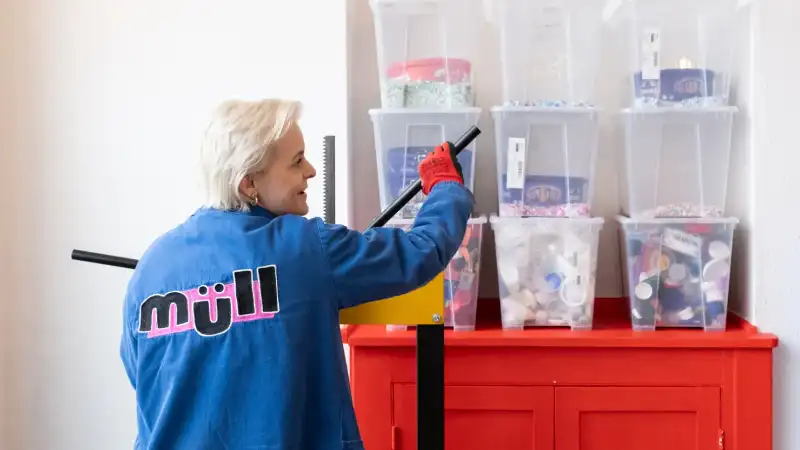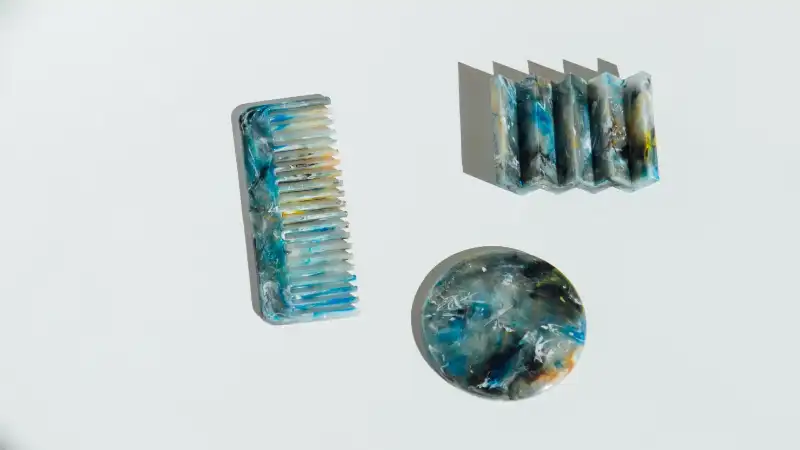British designer Charlie Rudkin-Wilson is transforming discarded plastic into stylish homewares that have landed features in Vogue and partnerships with luxury retailers like Fortnum & Mason. Her startup, Müll.Club, uses everyday waste — from shampoo bottles to candy tubs — to create eye-catching items like coasters, soap dishes, and rings with distinctive marbled finishes. This article explores how the business started, its sustainability mission, and where it’s headed next.
Everyday Trash, Luxury Design
Rudkin-Wilson, a fine art graduate and former sustainability consultant, launched Müll.Club during the COVID-19 pandemic. What began as a London-based refill shop evolved into a studio crafting products from discarded plastic. Her first design, a zigzagged soap dish made from used yogurt and porridge pots, remains the brand’s best-seller at £16 (around $21).
The “Take Out” coasters, made from black-and-white cutlery and translucent food containers, retail for £14 and demonstrate Müll.Club’s ability to convert overlooked materials into functional art. Each item is made by melting down single-use plastics and reshaping them into goods that are both sustainable and beautiful.

Mission: Redefining Plastic as a Resource
“Part of the whole mission is to change the perception of plastic waste,” Rudkin-Wilson told CNBC. Rather than viewing plastic solely as trash, Müll.Club aims to frame it as a valuable, versatile material. Her approach combines aesthetic design with responsible sourcing — relying on public donations of used packaging that would otherwise end up in landfills.
Current recycling systems, especially in the U.K., fall short. According to recent WRAP data, nearly half of the plastic marked for recycling is exported abroad. Müll.Club offers an alternative by processing that waste locally into high-quality items. An online platform even lets donors track the journey of their plastic, including weight metrics and carbon savings.
Growing Interest from Major Brands
Müll.Club’s model has caught the attention of corporate partners. Personal care brand Lush sent over 32 kilograms of used plastic, which was turned into 2,000 hair combs. A luxury automaker — after Rudkin-Wilson’s appearance on the U.K.’s Dragon’s Den — approached the startup about recycling bonnet linings into consumer goods.
Fortnum & Mason supplied signature turquoise packaging waste to be transformed into trays and coasters. British Vogue praised Müll.Club as a “revolution of stylish sustainability.” Rudkin-Wilson sees this as a major win: “Can you imagine that someone’s yogurt pot that they’ve eaten out of is in Vogue… just in a different form?”
Scaling Up: Bigger Studio, Bigger Vision
Based in a studio in Margate, Müll.Club will soon move into a larger space with new machinery capable of processing higher volumes of plastic. Rudkin-Wilson plans to begin designing furniture and larger-scale pieces while maintaining the brand’s core focus on small, artistic homewares.
She’s currently seeking £250,000 in funding to support this expansion, including investments in marketing to grow the customer base. Alongside retail through Müll.Club’s website, her products are sold in independent shops and museum stores across the U.K. and U.S.

Looking Ahead: A Shift in Industry Thinking
For Rudkin-Wilson, the future lies in systemic change. She believes manufacturers must take greater responsibility for the full life cycle of their plastic products — not just during production, but after consumers are done with them.
“The industry will change and more private innovative businesses will appear, moving the industry away from traditional inefficient kerbside recycling,” she said.
By combining design innovation with waste recovery, Müll.Club is offering more than attractive goods — it’s creating a model for how discarded materials can fuel a circular, creative economy. And with designer trays made from candy tubs now gracing luxury stores, that future is already taking shape.






